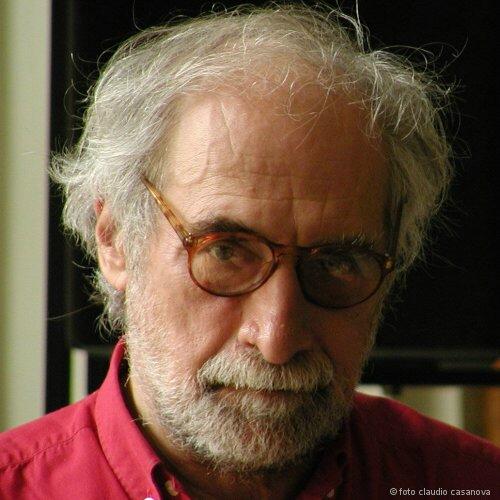RZEWSKI'S BIOGRAPHY
(unfinished)
by Alvin Curran




Socrates buttonholed Rzewski in the Harvard yard and bluntly asked "Rzewski,
why are you so contemporary?" Cage, appearing indignantly from behind a resonant
mushroom, objected, "but Socrates, that's my line from the Norton Lecture IV."
And Socrates, removing his dark glasses and thoughtfully putting his alto sax
on a marble bench, returned: "dear sir, chance operations are only part of this
existential mesostic, besides Rzewski's my main man." Then Rzewski, convulsed
but elated by this cabal of "Pesci d'Aprile" and with a digital segue faster
than MTV, pulled his right hand from under his left armpit and with it the crumpled
score of his new opera Das Kapital and flung it - as if Discobolus whirling
a frisbee - into the Charles River. When Zeus and Thoreau, both witnesses to
this act, swooped down like a pair of mating osprey to grab the sopping score,
they braked and split, when they saw the fisherman Martin Buber calmly humming
a talmudic air as he reeled in this now fully baptized catch, thinking he'd
caught a big carp. Whether this led to his famous book "Oy or Thou" we will
never know but the wet opera and some years later the entire archive of the
legendary roman legion MEV was tossed down the incinerator shoot in Rzewski's
Washington Heights apartment building. A radical proceedure for drying damp
music but nonetheless one which quickly reduced the entropy factor by 100% compared
to having to perform or listen it. Some have described Rzewski's life as a kind
of last month's Time magazine in a hospital emergency room, and others as a
page from Plato's Parmenide - both equally incomprehensible and both equally
promising a comprehensive understanding of all things. The origins are obscure
(Rzewski himself having spent much of his life wondering where he came from)
but Slavic scholars claim the word Rzewski refers to a protomusical form of
improvisation practiced by pregnant women in regions of the Carpathian Mountains
while the Ukranian school found that Rzewski is the Kabbalistic spelling for
a secret group of Medieval anarchists who invented the Yiddish language. In
any case all agree the the word means peace and trouble, often at the same time.
Now to the facts. In l969 Steve ben-Israel was leaving on a special Living Theater
mission for Cuba to encourage the Cigar industry there to return to rolling
their own; before he left he gave Rzewski a piece of plate glass in the shape
of a piano which Frederic (as he was known to his friends) applied a contact
mike to and immediately taught himself to play. It was here, that Rzewski heard
"music" for the first time, because he was making it as if for the first time
and in those unifed times that meant for both him and everyone else. Hence,
MUSIC was born in a dank, smelly cavernous old foundery in Transtiberium (now
known as the Trastevere quartier of old Rome). This was exactly 31 years after
Rzewski himself was born in Westfield Mass. slightly to the southeast of his
father's Pharmacy. His childhood was aided by normal polish-american food, the
radio and a desire to remake the world from scratch, to do this he helped his
father fly to work gathered mushrooms, with his brothers and sisters and sat
at the family piano thinking what a strange and mysterious sound was that of
the word Chopin (Show Pan) - to be sure, just another polish-american composer
like himself, like he would become.

Frederic Rzewski and Alvin Curran, Via dell'Orso